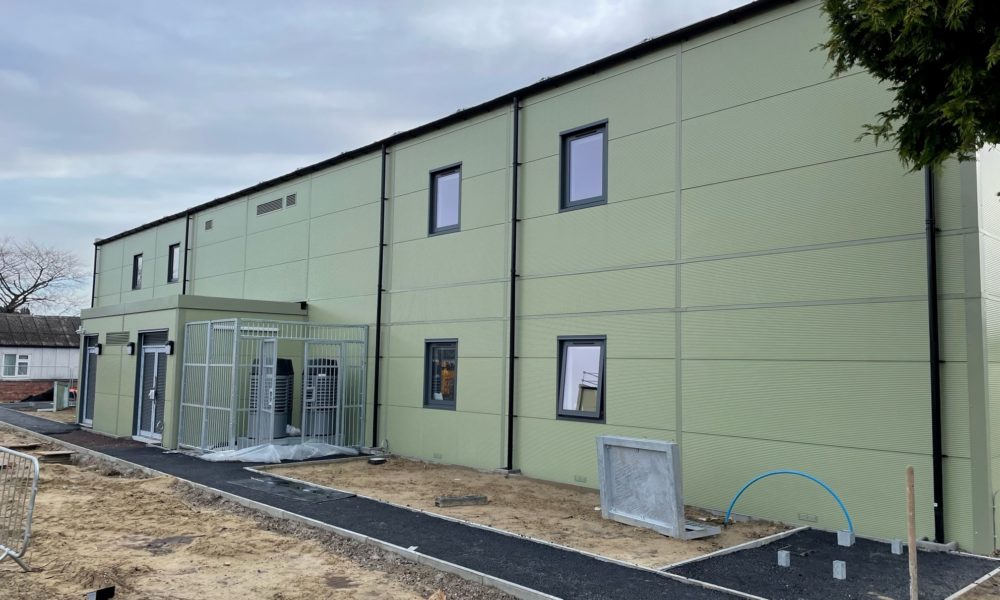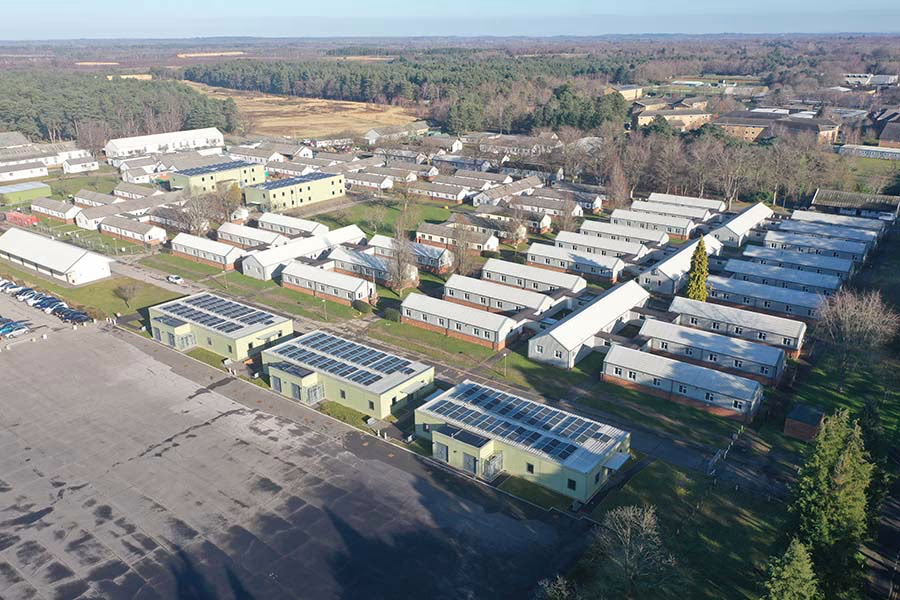We use cookies to provide you with a better experience and ads personalisation. Learn more in our Privacy Policy.
Residential
MOD Army Training Centre Pirbright, Woking
-
Category
Residential
-
Construction Cost
-
-
Architect
-
-
Contractor
Harwood join DIO, Landmarc Support Services (Landmarc) and Reds10 to provide new accommodation blocks at Surrey training camp as part of NetCAP initiative for the MOD
The Net-Zero Carbon Accommodation Programme (NetCAP) is a multi-million-pound initiative to improve living conditions for the country’s armed forces, while contributing to the government’s push to achieve net zero emissions by 2050.
The programme as a whole is set to deliver over 70 new carbon efficient accommodation blocks, providing more than 3,900 beds in army training facilities across the UK Defence Training Estate.
In many cases this accommodation had not been upgraded for decades, and the project has seen the demolition of several outdated buildings such as Nissen huts which had been in use since the 1930s.
Modular construction specialist Reds10 were brought in to design and construct all the accommodation offsite with a brief to deliver net zero buildings. Westdown Camp on Salisbury Plain was the first site to take delivery of the new accommodation in summer 2020.
A subsequent phase of the programme included upgrading the accommodation at Brunswick Training Camp at Pirbright in Surrey, where new recruits embark on a 14-week training course when they first join the army.
A long-established working relationship meant that Reds10 brought Harwood in to act as Building Control Advisors for the Pirbright site, with Shaun O’Neill as Project Manager. ‘I’ve worked with Reds10 for a number of years,’ says Shaun. ‘Working with a familiar design team on every job means we can be very efficient – we work well together.’
Harwood see clear advantages to using modular construction when it comes to reducing carbon emissions, a central principle of the NetCAP project, with the ‘high level of detail on air tightening and insulation measures undertaken on each unit contributing to the Government mandated target of net zero by 2050.’
There are also advantages in terms of Building Control. As Shaun explains: ‘Modular units comply with the same building regulations as traditional buildings. As the units are often manufactured in factory conditions, they are easier to inspect for compliance with building regulations, as multiple pods can be inspected at the same time, at the same stage of construction, and any snags can be dealt with in the factory. Lessons learnt from previous units can be put forward to improve the quality of further units.’
Harwood were on hand to offer help and support throughout the process, consulting with the Fire Officer and providing early advice on design layouts to ensure consistency in compliance with regulations, and constantly reviewing new information as the project evolved.
Central to the carbon-neutral aspect of the NetCAP scheme has been the requirement to deliver the lowest carbon usage possible, and Reds10 have not been slow off the mark in introducing AI to aid in the development of this process.
‘We installed SMART technology…to monitor the energy demands of the building and feed back directly into subsequent building design and specifications,’ says CEO Paul Ruddick. ‘We’re proud to be able to continually push our modular construction methods to deliver these sorts of results throughout the programme.’
Pirbright directly benefited from these subsequent improvements, with quicker construction times and improved EPC (Energy Performance Certificate) ratings compared with previous buildings in the project, all of which have received DREAM accreditation (the defence equivalent of BREEAM accreditation).
Independent recognition for Reds10’s involvement in the NetCAP project came in the form of a Government Opportunities (GO) award in 2021 and a ‘Highly Commended’ in the Sustainable Construction category at the Sanctuary Award in 2020, both jointly awarded alongside the DIO (Defence Infrastructure Organisation) and Landmarc, who provide support services to the armed forces. The project has most recently also been awarded the ‘Net Zero and Resource Efficiency Award’ at 2021’s MOD Sanctuary Awards.
Brunswick Camp is also the site of the Defence Training Estate’s first double-storey accommodation facilities, a move which will result in additional factors regarding building control for Harwood: ‘As units can be stacked to form multi-storey structures, the connection details between units and fire stopping methods are more complicated than in traditional builds. As such, it is crucial that all modules are inspected by a trusted building inspector.’
Looking ahead, Harwood’s Operations Director Adam Dodd sees continual growth for the move towards using MMC – in particular, modular construction – across all sectors of the industry: ‘We’re witnessing an increased demand for modular construction year on year, with around 5 – 10% of our business enquiries now centering around this construction method,’ he says.
With environmental benefits being right at the heart of the NetCAP project, this is a trend that is only going to increase.
With this phase of the programme complete, Tom Hook, Senior Project Manager (NetCAP) at Reds10 comments: ‘Reds10 and Harwood have a great working relationship. Both companies particularly value efficiency and clear communication, which is apparent in our work together. It’s been a pleasure having Harwood onboard for our work on the NetCAP scheme.’
For more information about Harwood and how our building control inspection services can add value to your projects, get in touch with our team today on +44 (0)1227 931 777 or email enquiries@harwood.uk.com.
Need help with a project
Contact our team today for a quote

